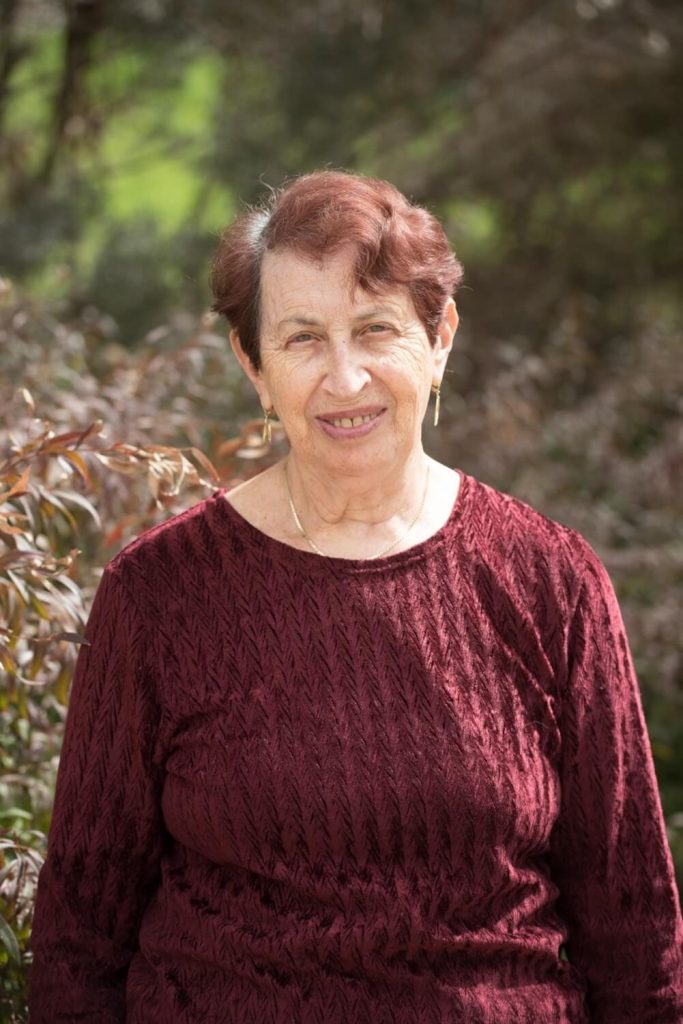
"תודה לאל, יש לנו מדינה משלנו. נשמור עליה מכל משמר מאוחדים וחזקים".
"הייתי תינוקת כשהנאצים פלשו להונגריה במרץ 1944. היהודים סומנו בטלאי צהוב, רכושם הוחרם, והם רוכזו בגטאות. גם אני ומשפחתי עברנו לגור בגטו שבעיר. במאי 1944 התחילו גם הגירושים לאושוויץ, וכשמפלגת 'צלב החץ' האנטישמית עלתה לשלטון, נרצחו אלפי יהודים ברחובות ועל גדות הדנובה, ואלפים הוצעדו מקילומטרים לעבר הגבול האוסטרי.
אבי גויס לעבודות כפייה במחנות עבודה, הוא ויהודים נוספים ישנו בקור מתחת לכיפת השמיים ועונו על ידי השומרים. אימי נשארה איתי בגטו, אך בהמשך הופרדה ממני בכוח ונשלחה לעבוד במפעל לבנים. שם הוחזקה בתנאים לא אנושיים עד שנשלחה עם מאות יהודים לעיר המעבר הדיישהאלום, שבגבול אוסטריה-הונגריה. אנשי 'צלב החץ' שליוו אותם התעללו בהם, והם ניזונו רק משלוש מנות מרק ביום. מי שנפל בדרך נורה או גווע בצידי הדרך.
אימי וכל מי שצעד איתה היה רעב, עייף ובאפיסת כוחות. הדיפלומטים השוודיים, ראול וולנברג ופר אנגר, שפעלו למען יהודי הונגריה, שחררו אותם מהשיירות והחזירו אותם לעיר במשאיות הצלב האדום. הם גם סיפקו להם מסמכים מזויפים, המעידים שהם נמצאים בעיר בחסות שוודיה.
כשבודפשט שוחררה, אבי חזר ממחנות העבודה, הוא הצטרף לאימי, ויחד הם איתרו אותי בבית היתומים של הצלב האדום, כך התאחדה המשפחה הקטנה. בסיום המלחמה הגענו לסאטו מרה. גרנו בדירת חדר, ולהוריי הייתה שם חנות קטנה, שבה הם מכרו פירות ודליקטסים. ביוני 1950 עלינו נרגשים לארץ, לנמל חיפה, באונייה טרנסילבניה. במשרד הפנים החליטו שנקבל שם עברי, כך נהייתי חדוה, אבי מוריס נהיה משה ואימי אונוש נקראה אילנה.
אימי ואבי התחילו את חייהם במעברה בשכונת תלפיות שבירושלים. הם עבדו בניקיון ובבניין וגם פתחו מזנון, וכשעברו לנתניה פתחו בביתם מסעדה, שבה סעדו ניצולי שואה רבים. הם היו שמחים בחלקם והיו דוגמה לחריצות, לעמידה באתגרים, לגמילות חסדים ולהכנסת אורחים. כיום אני גרה בירושלים, ויש לי משפחה מקסימה ואוהבת ו-4 נכדות, שאחת מהן התחתנה השנה."
Hedva Raber – born in 1942 in Budapest in Hungary
“Thank God we have a State of our own. We will guard it fiercely, united and strong.”
“I was a baby when the Nazis invaded Hungary in March 1944. Jews were identified by a yellow patch, their property was confiscated, and they were gathered into ghettos. I and my family moved to the city’s ghetto. In May 1944 they also began the expulsions to Auschwitz, and when the antisemitic Arrow Cross party came to power, thousands of Jews were murdered in the streets and on the banks of the Danube, and thousands were forced to march many kilometers towards the Austrian border.
My father was sent to a forced labor camp. He and other Jews slept in the cold under the sky and were tortured by the guards. My mother stayed with me in the ghetto, but later she was forcibly separated from me and sent to work in an underwear factory. There she was held in inhuman conditions until she was marched with hundreds of other Jews to the Hegyeshalomba transit town on the Austrian-Hungarian border. The Arrow Cross people who accompanied them abused them and they only received three portions of soup a day. Whoever fell on the way was shot or died by the roadside.
My mother and everyone on the march was hungry, tired and collapsing. The Swedish diplomats, Raoul Wallenberg and Per Anger, who were working for the Jews of Hungary, released them from the march and sent them back to the town on Red Cross trucks. They also gave them forged documents, saying they were under Swedish protection.
When Budapest was liberated, my father returned from the labor camp and rejoined my mother. Together they found me in a Red Cross orphanage, and reunited our small family. After the war we came to Satu Mare, where we lived in a one-room apartment and my parents had a small shop in which they sold fruit and delicatessen. In June 1950 we arrived with excitement in Haifa, Israel on the ship Transylvania. The Ministry of the Interior decided we should have Hebrew names, so I became Hedva, my father Morris became Moshe, and my mother Anoush became Ilana.
My parents started their life in a transit camp in Talpiot in Jerusalem. They worked in cleaning and construction and also opened a café, and when they moved to Netanya, they opened a restaurant in their house, where they fed many Holocaust survivors. They were happy with their lot and set an example of hard work, facing challenges, giving charity and hospitality. Today I live in Jerusalem and I have a terrific loving family, with 4 granddaughters, one of whom is getting married this year.”